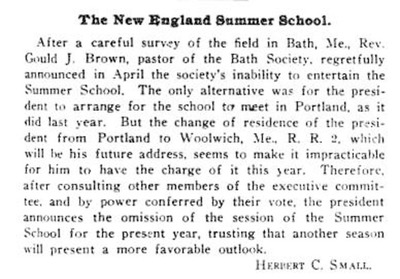The New England
Summer School
NEW items added in recent months:
Date Item Posted
Nov. 1913 League Journal articles 6/17
NOTE: Links in the text below refer to extensive articles from The New-Church Messenger reproduced below after the main text. There are significantly more article than are actually cited in the text.
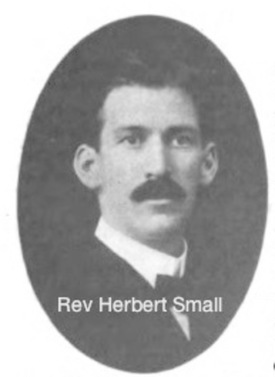 A very important precursor to the 1921 beginning of the Fryeburg New Church Assembly (originally called "Fryeburg Summer School") was the New England Summer School (NESS) in 1913 and 1914 led by Rev. C. Herbert Small, pastor of the Portland New Church.
A very important precursor to the 1921 beginning of the Fryeburg New Church Assembly (originally called "Fryeburg Summer School") was the New England Summer School (NESS) in 1913 and 1914 led by Rev. C. Herbert Small, pastor of the Portland New Church.
Rev. Small, along with Rev. John Whitehead, Walter A. Robinson, and Rev. Baman Stone, had a very active correspondence beginning in 1912 about starting a "New-Church summer school" in Maine like the Almont Summer School (now Almont New Church Assembly) in Michigan, then in its 14th year. Three papers were presented to the Maine Association annual meeting that year with the result being a committee set up to establish a summer school in Maine the following summer.
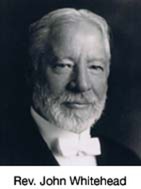 © FNCA 1925
© FNCA 1925
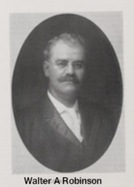
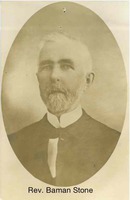
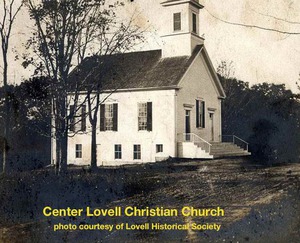 © Lovell Historical Society 2017
© Lovell Historical Society 2017
Center Lovell, just 15 miles northeast of the FNCA, was chosen as the site with lectures at the Center Lovell Christian Church and lodging and meals at the nearby Farrington House (the wife of Rev. Baman Stone, the Fryeburg New Church minister, was Emily Farrington).
Anouncements were placed in The New-Church Messenger for the first session of the NESS, August 27-29, 1913, with the annual meeting of the Maine Association at the same location on the two days following. The schedule each day included a lecture at 10:00 a.m., a “free-for-all question box, conducted out of doors when the weather is favorable” at 3:00, and an evening lecture at 7:30.
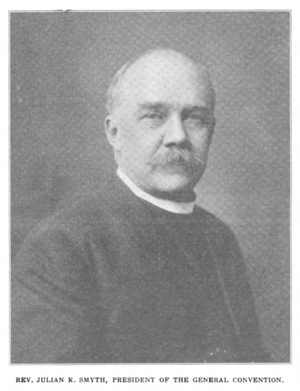 A detailed article by Rev. Small, including appended "Impressions of the New England Summer School" by five attendees, appeared in the October 1, 1913 issue of The New-Church Messenger.
A detailed article by Rev. Small, including appended "Impressions of the New England Summer School" by five attendees, appeared in the October 1, 1913 issue of The New-Church Messenger.
The first day, Rev. Julian Smyth, the president of Convention, spoke on “The True Canon of Scripture” in the morning, and on “The Re-discovery of the Bible” in the evening.
The second 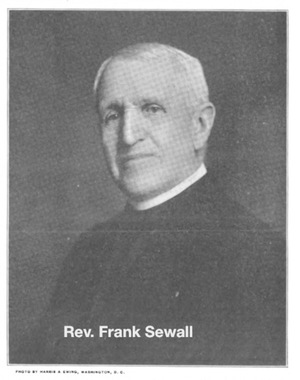 day’s lectures were by Rev. Frank Sewall, minister at our National Church in Washington DC (and the "driving force in the creation of the Swedenborg Scientific Association"), with a class on “The Beginnings” in the morning, and an evening lecture on “Some Problems of Life and Their Answer in the Light of the New Church.”
day’s lectures were by Rev. Frank Sewall, minister at our National Church in Washington DC (and the "driving force in the creation of the Swedenborg Scientific Association"), with a class on “The Beginnings” in the morning, and an evening lecture on “Some Problems of Life and Their Answer in the Light of the New Church.”
The third day was devoted to the “Charter of the New Church: The Book of Revelation” with talks by Rev. Wm. Worcester, 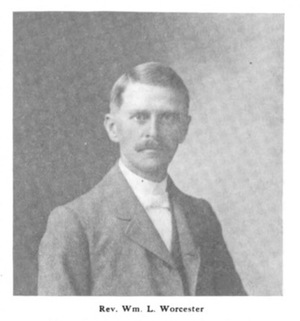 president of our theological school; the morning being a general survey of the teachings of the whole book, and the evening lecture on the two essentials of the New Church: “obedience to the Decalogue... and the heart acknowledgment of the Divine character of the Lord’s Human.”
president of our theological school; the morning being a general survey of the teachings of the whole book, and the evening lecture on the two essentials of the New Church: “obedience to the Decalogue... and the heart acknowledgment of the Divine character of the Lord’s Human.”
This telling paragraph from the article cited above delightfully sums up the camaraderie and tone of the entire event:
During the entire session of the School and Association, the fine old Farrington House, which had been opened for the accommodation of guests, with its commanding site, its broad and breezy verandah on three sides of it, its comfortable, commodious and well furnished parlor, including an organ, its sunny dining room, was made the headquarters, and was the chief center of life and movement, the great bond of unity. In a similar manner, if in less degree, did the homes of Judge Barnard, who gave an informal reception to the whole company, and Mr. Werren, contribute to the life of the School. Thirty people were entertained, wholly or in part, at the Farrington House. With Mr. Werren at the organ, all met in the grand old parlor for a “sing” on the eve of the opening of the School.
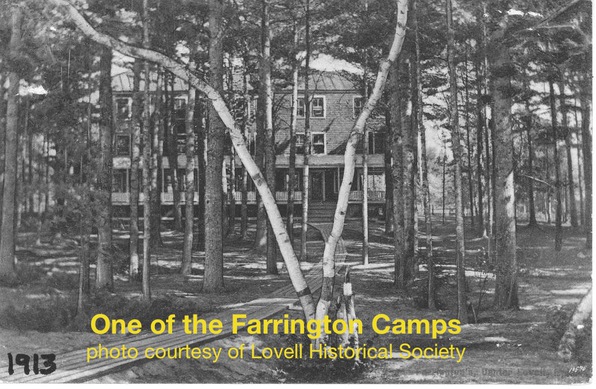 © Lovell Historical Society 2018
© Lovell Historical Society 2018The article went on to say that attendance that first year was thirty-eight people, with forty-two names listed as constituting the initial charter membership of the NESS. The session was considered such a success they decided to do it again the following year.
In April of 1914, at a “well-attended meeting” in Boston, they drew up a constitution, elected officers, switched the site to the then-new parish house of the New Church in Portland, and decided to extend the session to four days.
This second year was reported to have been even more popular than the first year in an extensive article, including a great deal of detail about the lectures, by the Rev. John Whitehead in the September 23, 1914 issue of The New-Church Messenger:
The signatures to the register showed seventy-two persons in attendance from the following places: Portland, Fryeburg, Centre Lovell, Bath, Yarmouth, Deering, Cape Elizabeth and South Paris, Maine; Washington, D.C.; Boston, Abington, Bridgewater, Brookline, Cambridge and Woburn, Mass.; Cincinnati, Chillicothe and Toledo, Ohio; New York City; Orange, N.J.; Providence, R.I.; and St Paul, Minn.
The following is all from the article cited just above.
The committee decided to rearrange the schedule a bit in 1914 with morning and evening lectures each day, and an outing in between.
Convention president, Rev. Julian Smyth, once again opened this second session of the NESS on Tuesday, August 23, 1914, speaking on “The Sacred Books of the New Testament” using the Socratic Method of questions and answers. The afternoon outing included a visit to the promenade overlooking Portland Harbor, Longfellow’s home, and Deering Oaks (a public park in Portland), as well as a municipal organ concert. Rev. Smyth’s evening address was titled, “The Dusk of the Old Theology and the Dawn of the New.”
Wednesday’s speaker was Rev. Adolph Roeder of Orange NJ, presenting both the morning and the evening lecture on “Basic Principles of Bible Symbolism” with the afternoon outing being a trip by trolley to Fort Williams in Cape Elizabeth.
On Thursday, Rev. John Whitehead addressed the crowd both morning and evening on the topic of “The Sacred Scriptures, Divine and Human,” focusing on Genesis in the morning, and on Isaiah in the evening. The afternoon excursion was “a trip in a launch around many of the numerous islands in Casco Bay.”
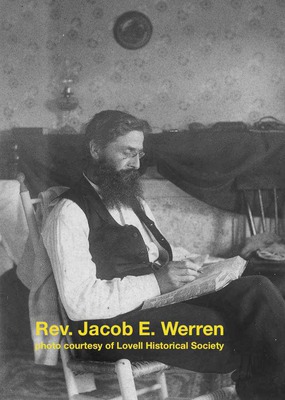 © Lovell Historical Society 2018On Friday morning, Rev. Jacob E. Werren of Cambridge MA addressed the group on “The Bible and Modern Language.”
© Lovell Historical Society 2018On Friday morning, Rev. Jacob E. Werren of Cambridge MA addressed the group on “The Bible and Modern Language.”
In the afternoon a large party accepted the invitation of Mrs. Annette G. Dresser to visit her home in Yarmouth, about one hour’s ride from Portland by trolley, passing through a beautiful country overlooking Casco Bay, with its numerous islands. Mrs. Dresser kindly entertained the company assisted by her two sons Paul and Philip and their accomplished wives. After a most delightful afternoon passed in the ancestral home pleasantly situated overlooking a beautiful valley, the party returned in time for the evening session.
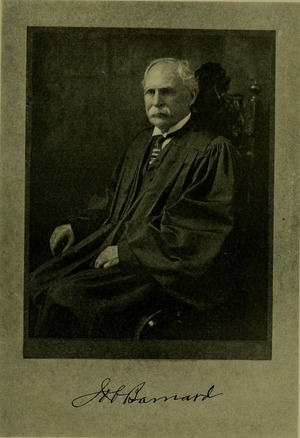 The final lecture Friday evening was on “The Bible and Modern Law” by the Honorable Judge Job Barnard of Washington DC. This lecture was printed in full in two successive issues of The New-Church Messenger in November 1914. Judge Barnard had just retired as an associate justice of the Supreme Court of the District of Columbia (as opposed to the U.S. Supreme Court) from 1899-1914. He went on to become the vice-president of Convention. The previous summer, Judge Barnard and his wife had hosted a reception for the NESS at their summer home in Center Lovell.
The final lecture Friday evening was on “The Bible and Modern Law” by the Honorable Judge Job Barnard of Washington DC. This lecture was printed in full in two successive issues of The New-Church Messenger in November 1914. Judge Barnard had just retired as an associate justice of the Supreme Court of the District of Columbia (as opposed to the U.S. Supreme Court) from 1899-1914. He went on to become the vice-president of Convention. The previous summer, Judge Barnard and his wife had hosted a reception for the NESS at their summer home in Center Lovell.
The next announcement about the NESS, however, was nine months in coming. In the July 21, 1915 issue of The New-Church Messenger, the following brief announcement, reproduced here in full, appeared:
The New England Summer School
After a careful survey of the field in Bath, Me., Rev. Gould J. Brown, pastor of the Bath Society, regretfully announced in April the society’s inability to entertain the Summer School. The only alternative was for the president to arrange for the school to meet in Portland, as it did last year. But the change of residence of the president from Portland to Woolwich, Me, R.R. 2, which will be his future address, seems to make it impracticable for him to have the charge of it this year. Therefore, after consulting other members of the executive committee, and by power conferred by their vote, the president announces the omission of the session of the Summer School for the present year, trusting that another season will present a more favorable outlook.
Herbert C. Small
Rev. Small, president of the NESS, had moved to Woolwich ME, near Bath, and asked the New Church there to host the NESS in 1915, but was turned down. Since travel took so much longer then, this made it too difficult for him to even consider running it in Portland again. And evidently, no-one else volunteered to take the helm, so they decided to cancel the 1915 session and hope for better arrangements the following year.
However, there is no known mention of the New England Summer School in The New-Church Messenger after that.
So this is the end of the NESS's story but, of course, it is NOT the end of our story.
In September of 1920, when the young Rev. Louis Dole became the new minister at the Fryeburg New Church, two of the original founders of the New England Summer School, Rev. John Whitehead and Mr. Walter A. Robinson, quickly made plans with Rev. Dole to start the Fryeburg Summer School the following year... and the rest, as they say, is history.
Articles about the
New England Summer School
from The New-Church Messenger,
and a series of three articles from the
November 1913 issue of the
New Church League Journal
1912
from the September 11, 1912 issue of
The New-Church Messenger:
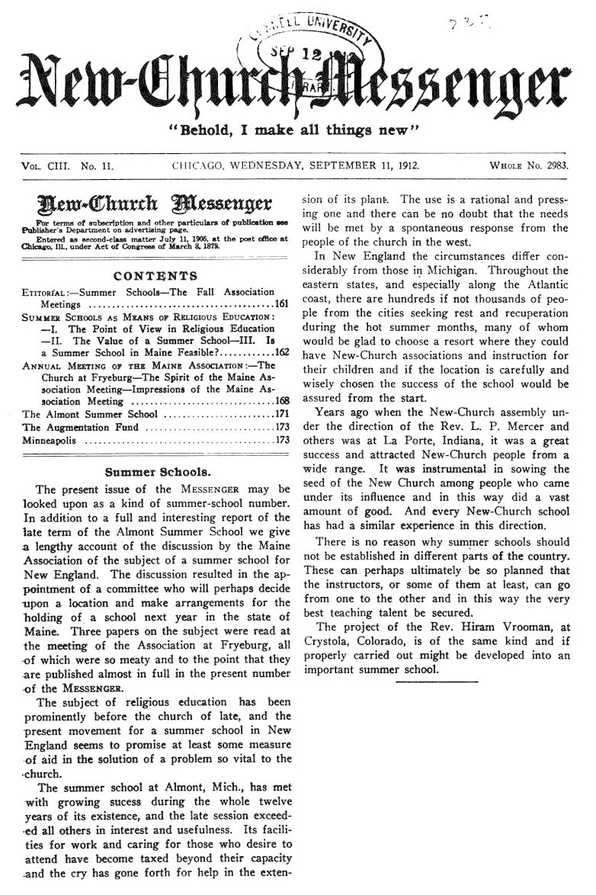
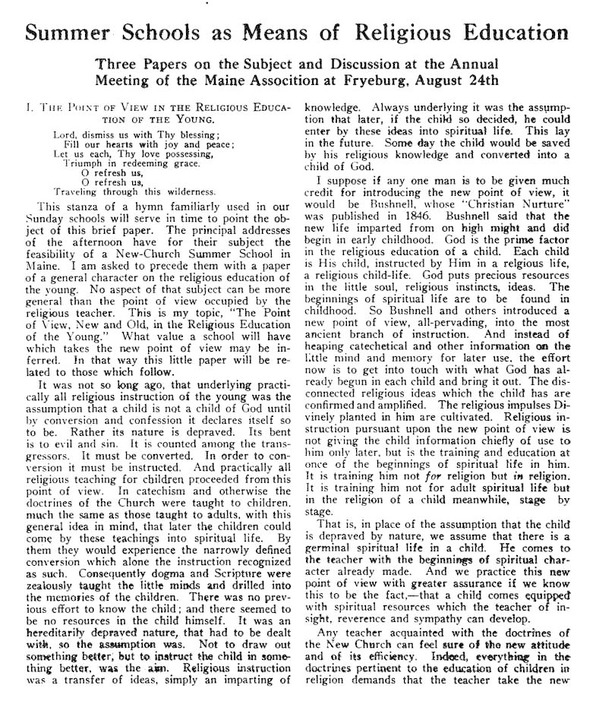
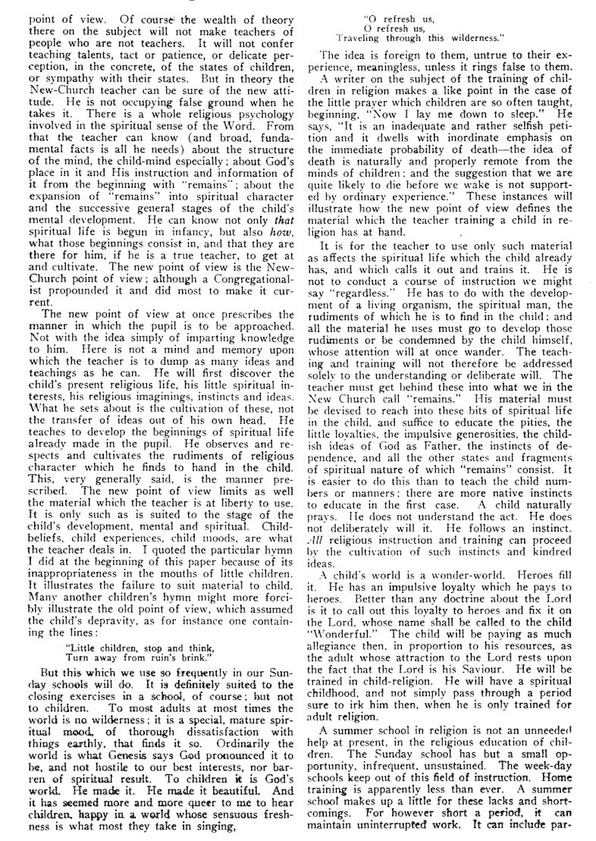
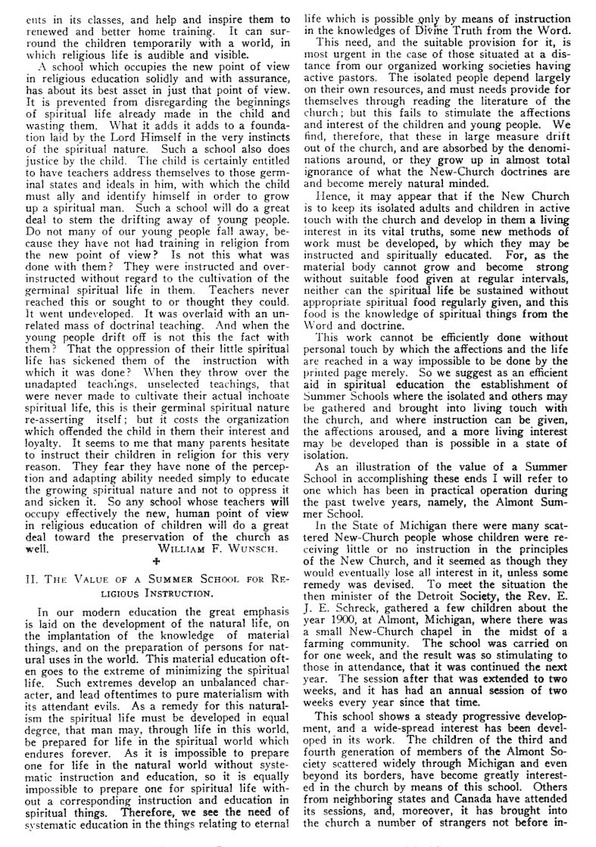
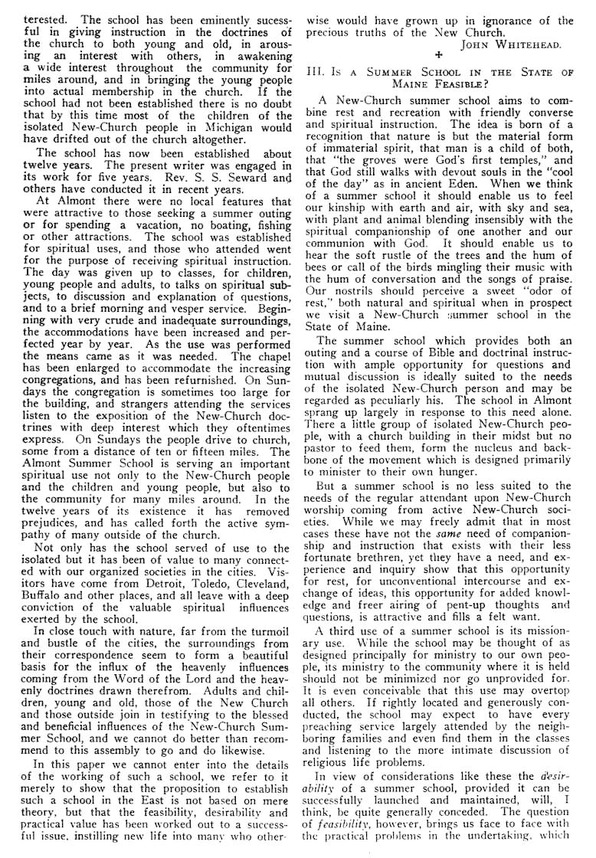
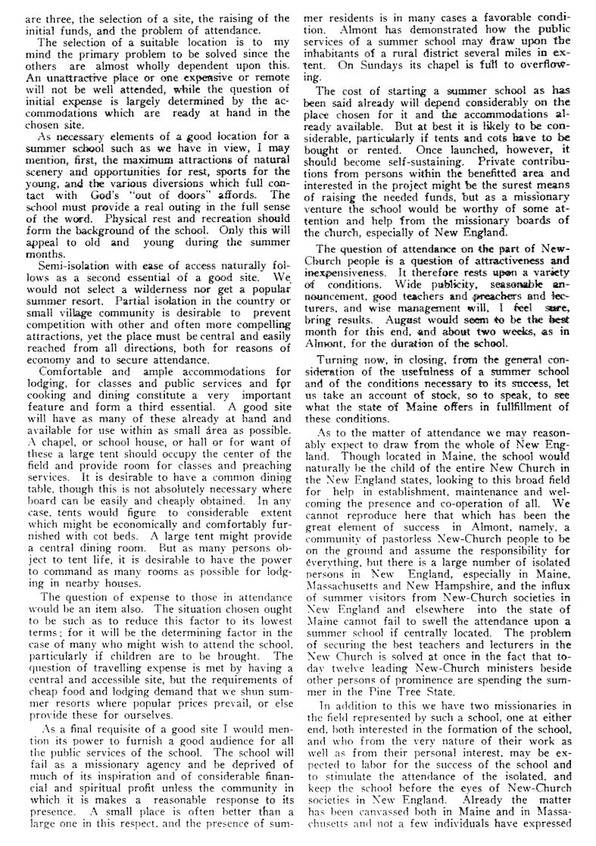
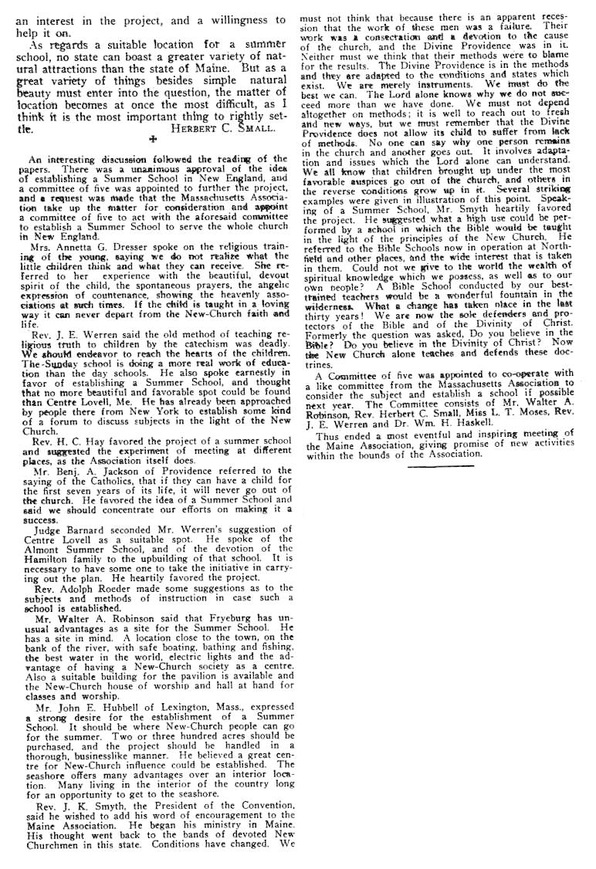
Excerpt from
"Impressions of the Maine Association Meeting":
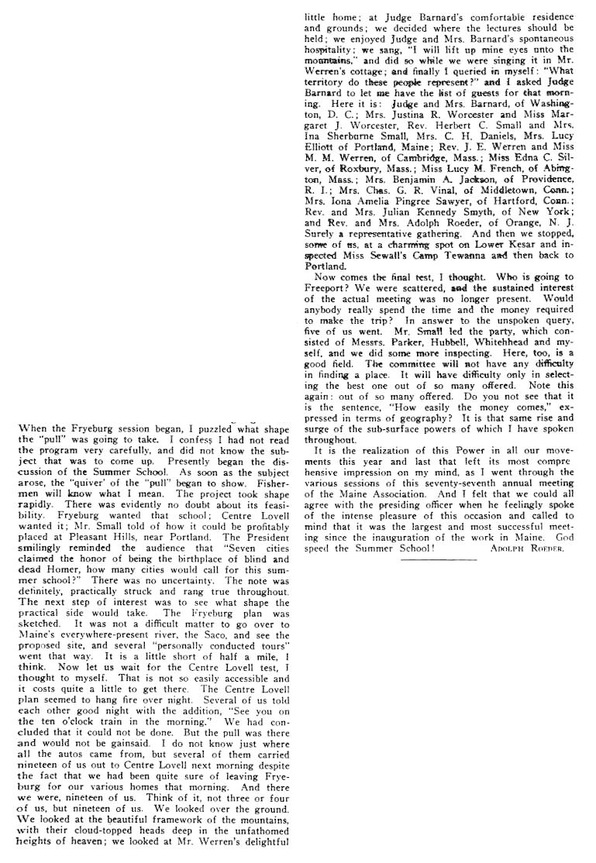
1913
from the July 2, 9, 16, 23, August 6, 13, & 20, 1913 issue of The New-Church Messenger
(with minor variations here and there):
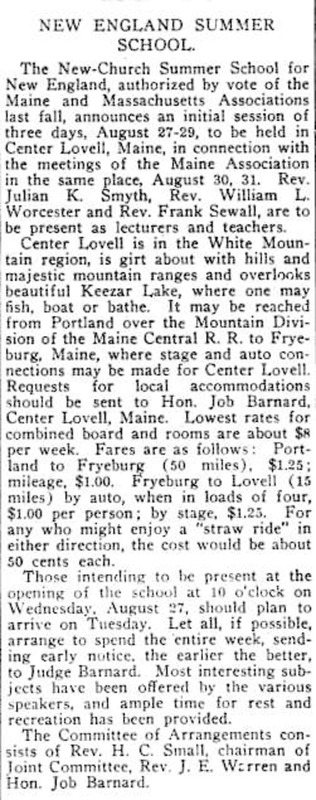
from the July 9, 1913 issue of
The New-Church Messenger:
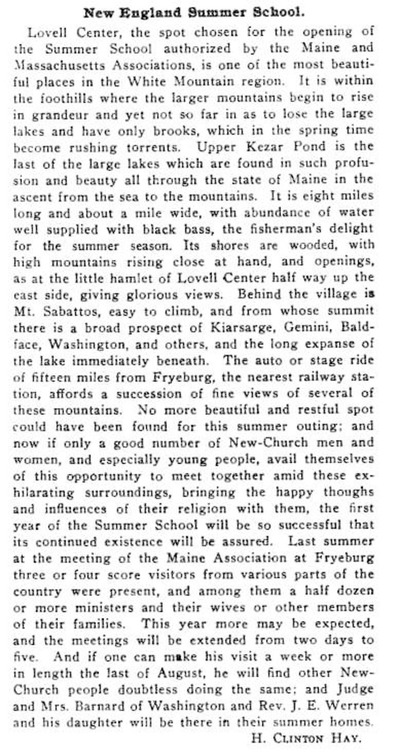
from the July 30, 1913 issue of
The New-Church Messenger:
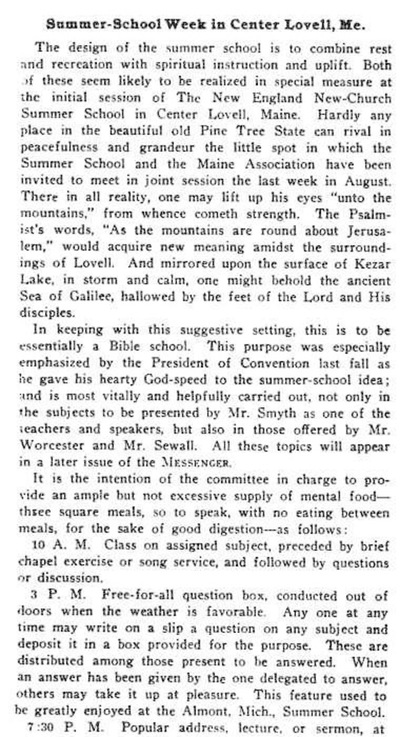
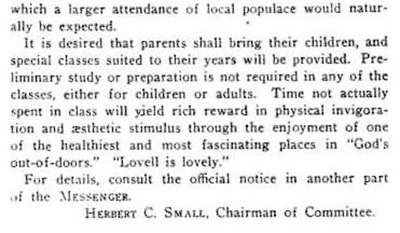
from the August 6, 1913 issue of
The New-Church Messenger:
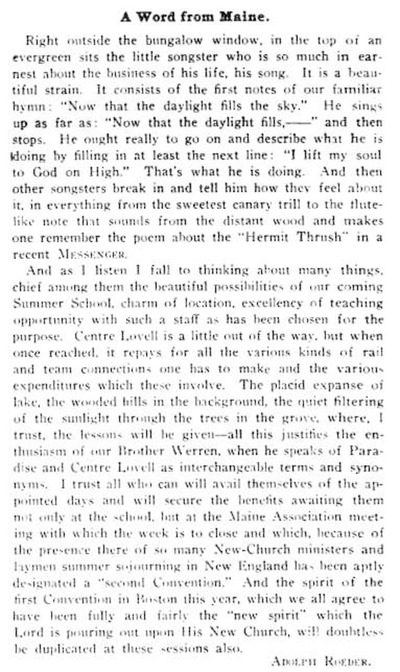
from the August 13, 1913 issue of
The New-Church Messenger:

from the August 20, 1913 issue of
The New-Church Messenger:
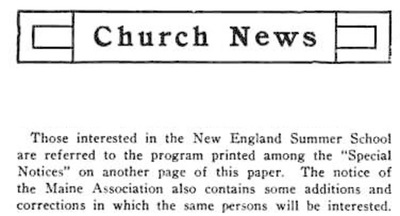
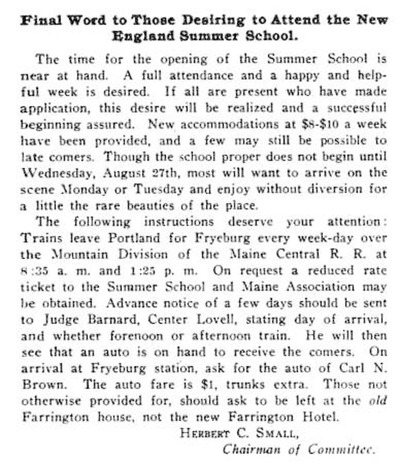
from the September 17, 1913 issue of
The New-Church Messenger
(in an article titled
"Recent Meeting of the Maine Association"):

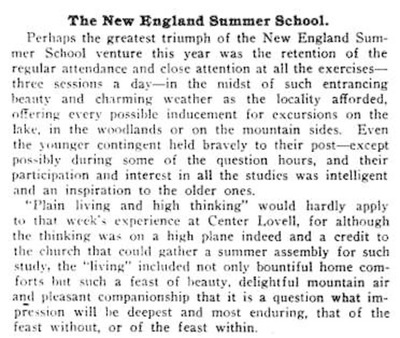
from the October 1, 1913 issue of
The New-Church Messenger:
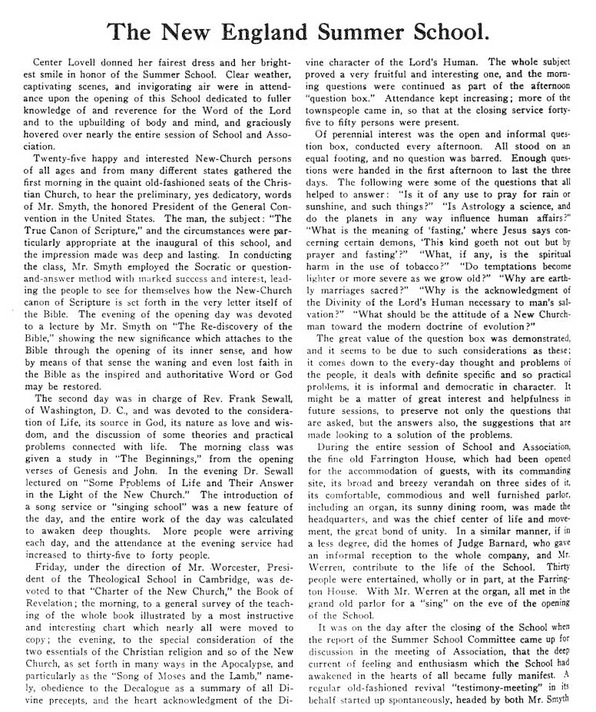
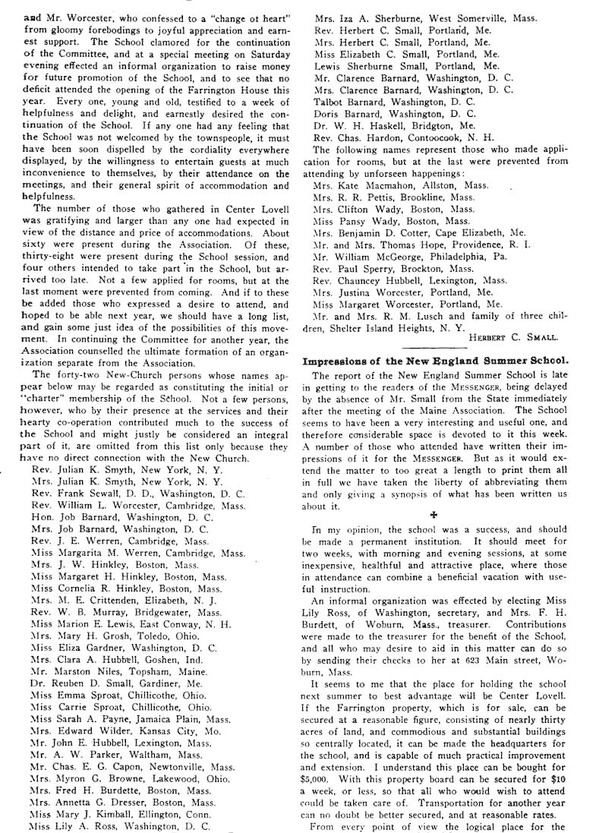
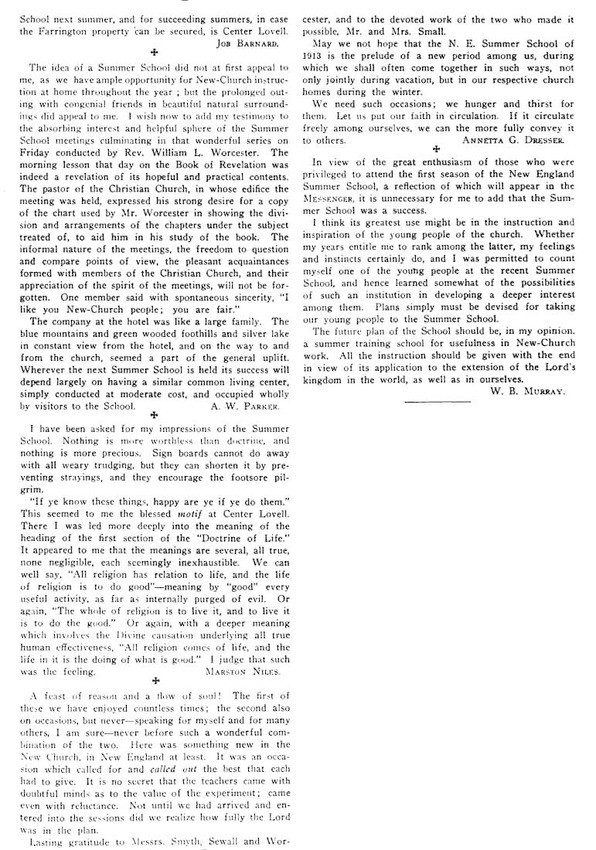
from the October 15, 1913 issue of
The New-Church Messenger:
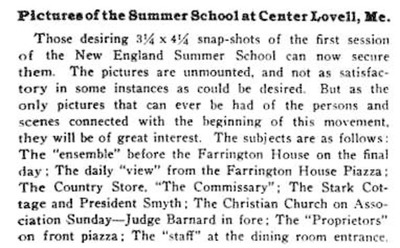

from the November 1913 issue of
The New Church League Journal
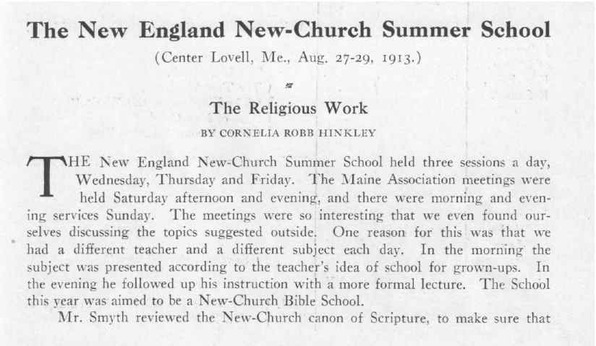
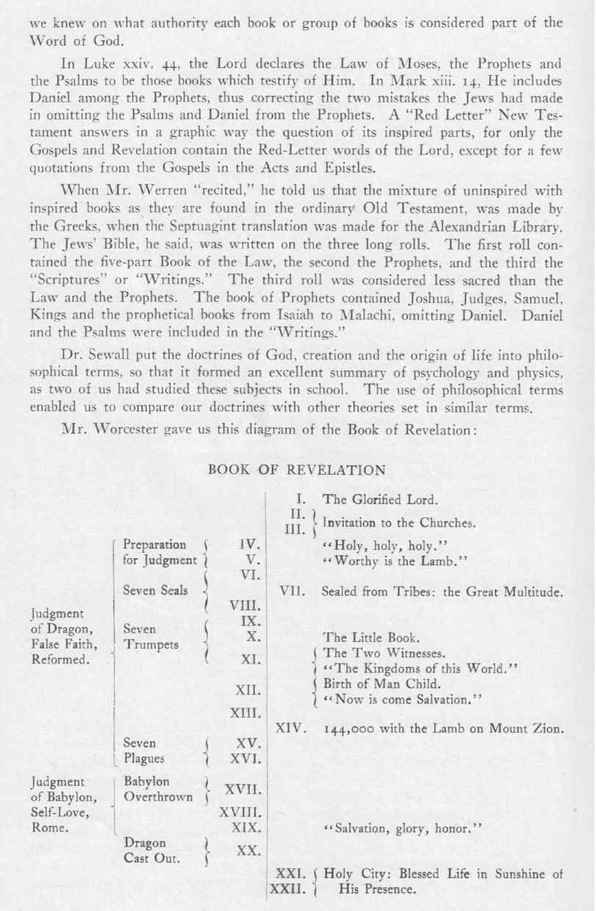
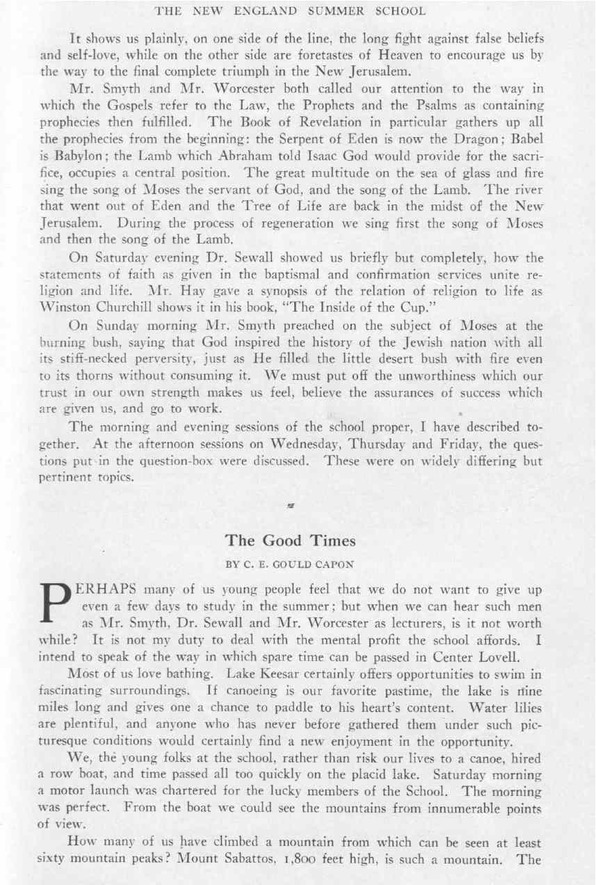
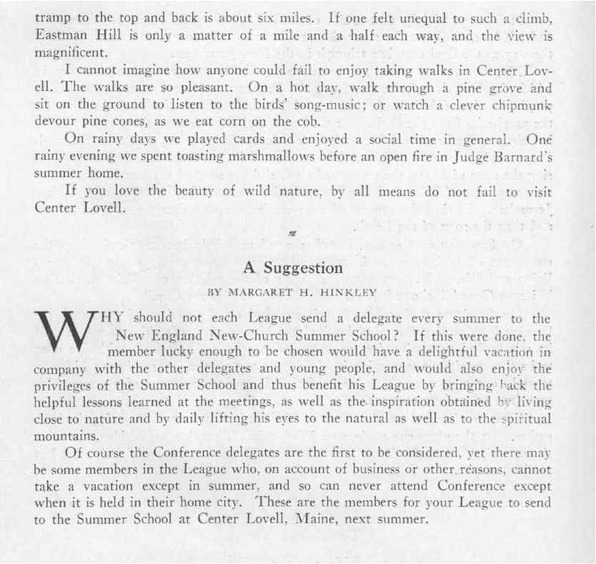
1914
from the July 1, 1914 issue of
The New-Church Messenger:
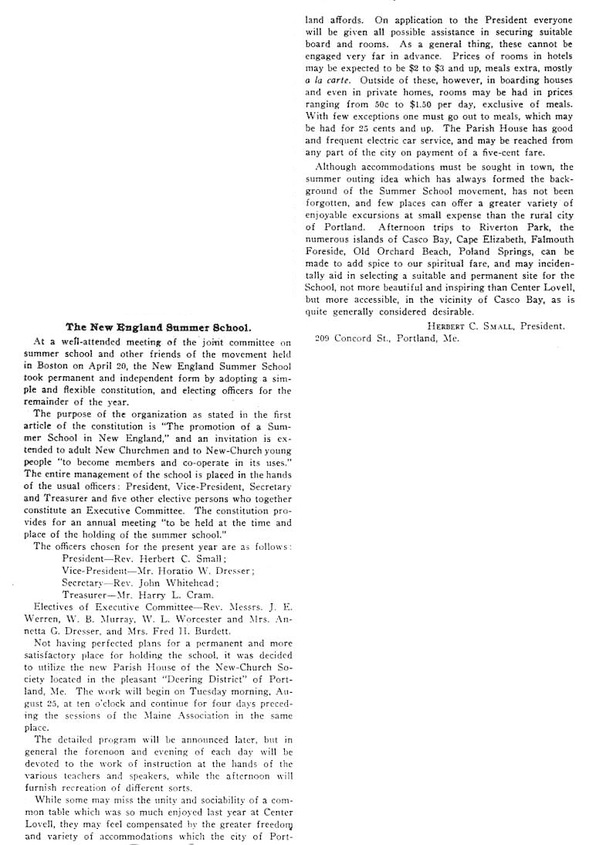
from the August 12, 1914 issue of
The New-Church Messenger:
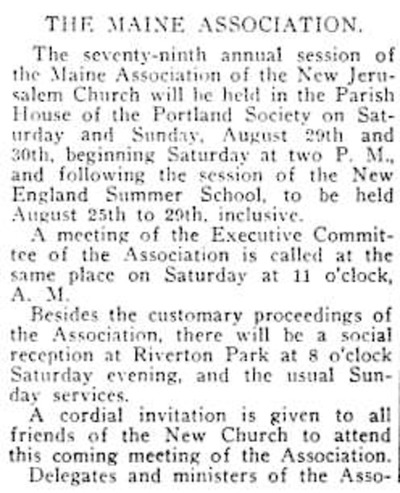
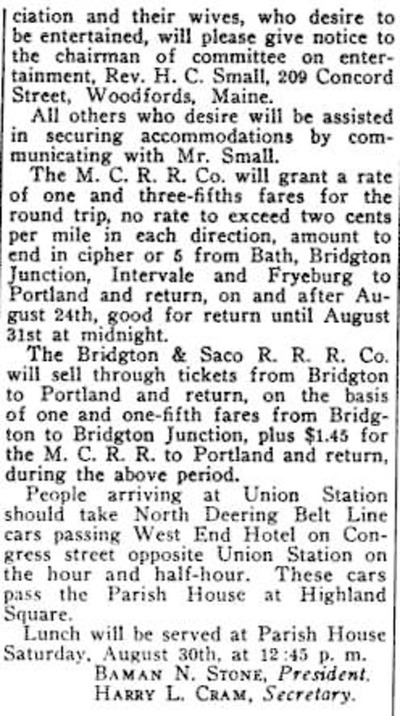
from the August 19, 1914 issue of
The New-Church Messenger:
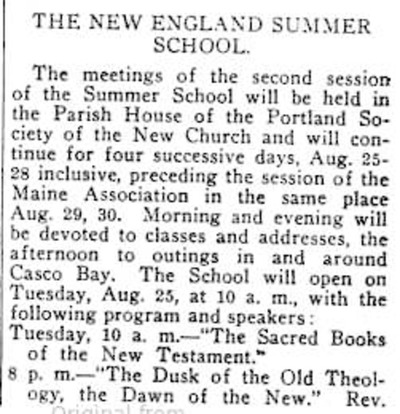
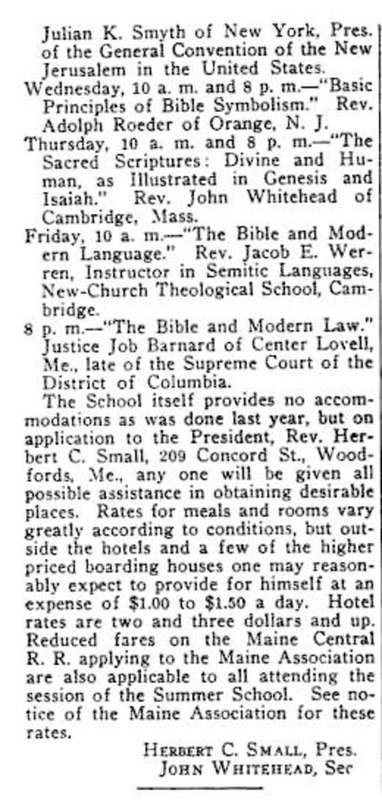
from the September 16, 1914 issue of
The New-Church Messenger:
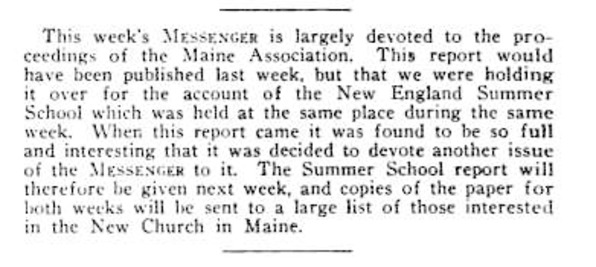
from the September 23, 1914 issue of
The New-Church Messenger:
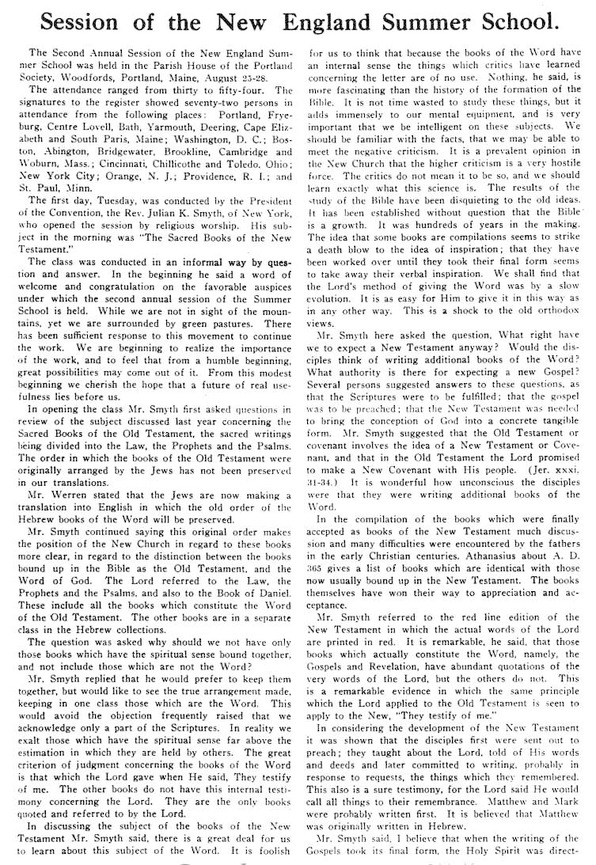
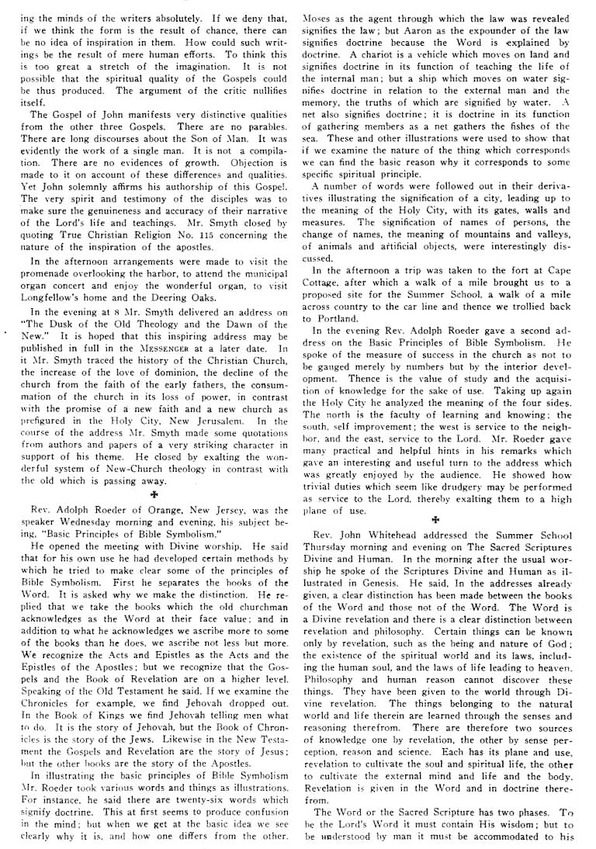
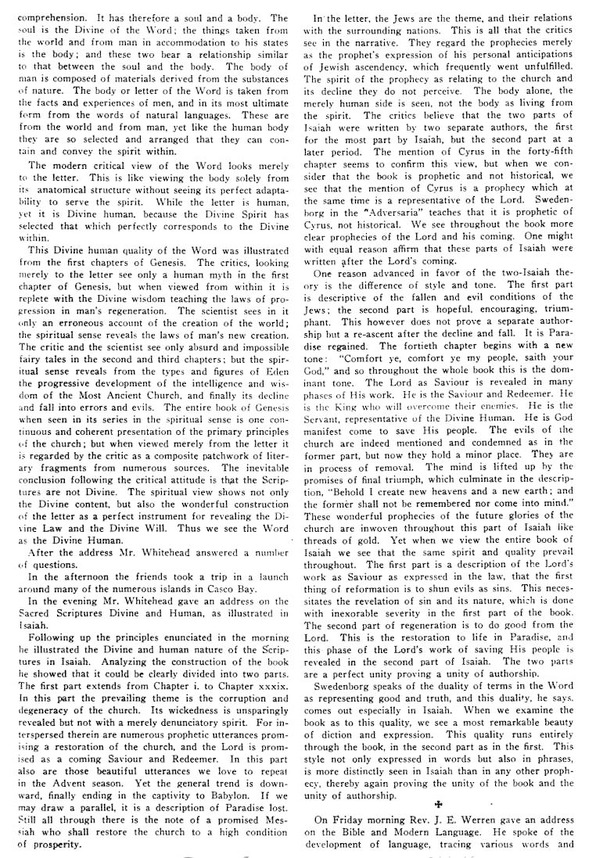
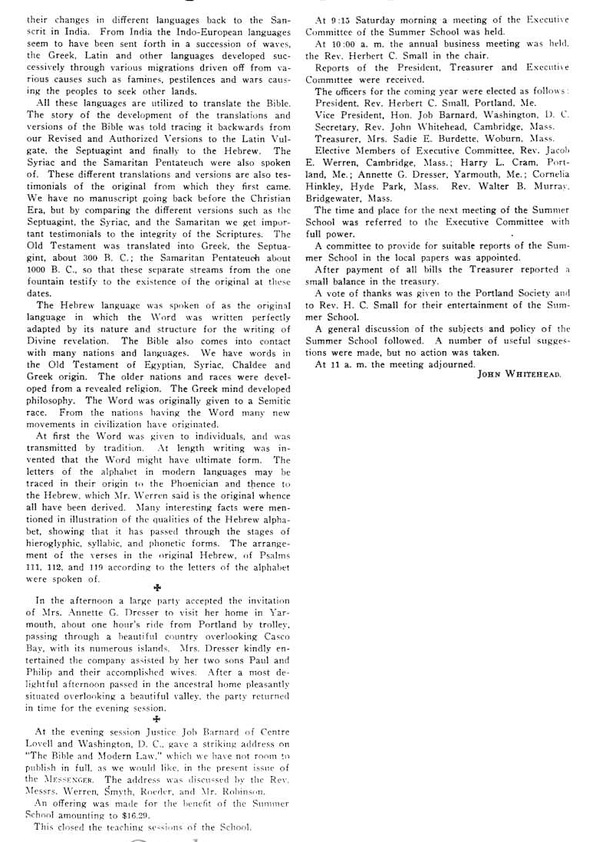
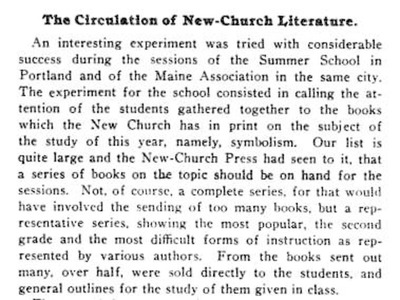
from the October 21 & 28, November 18 & 25, 1914 issues of The New-Church Messenger:
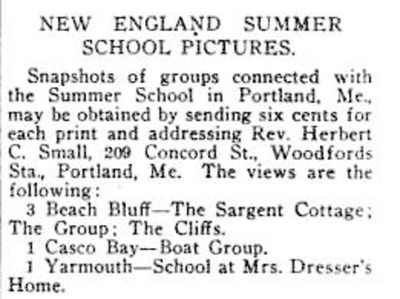
from the November 18, 1914 issue of
The New-Church Messenger:
Note: This lecture was given at the 1914 session of the New England Summer School by Judge Job Barnard who was an associate judge of the Supreme Court of the District of Columbia (as opposed to the U.S. Supreme Court) from 1899-1914 and a long-time summer resident of Center Lovell ME where the first session of the New England Summer School was held in 1913.
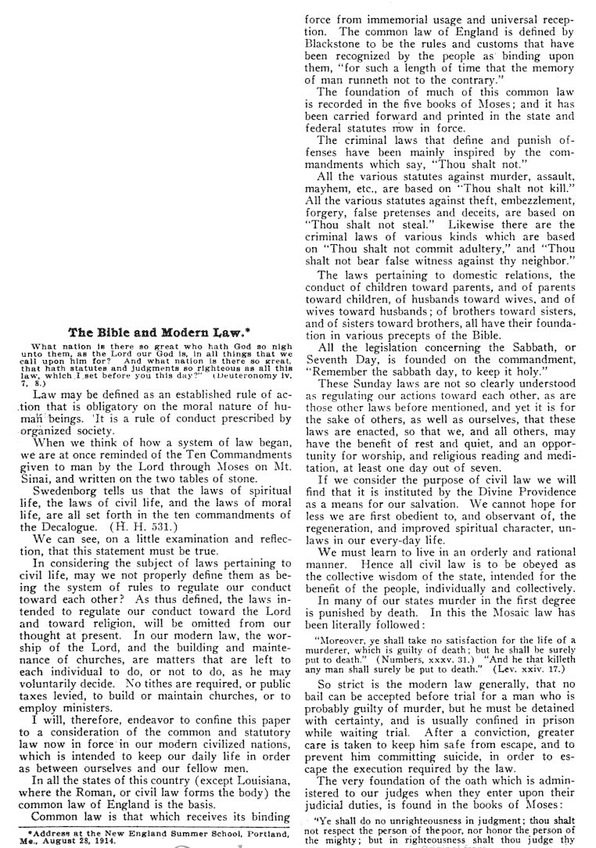
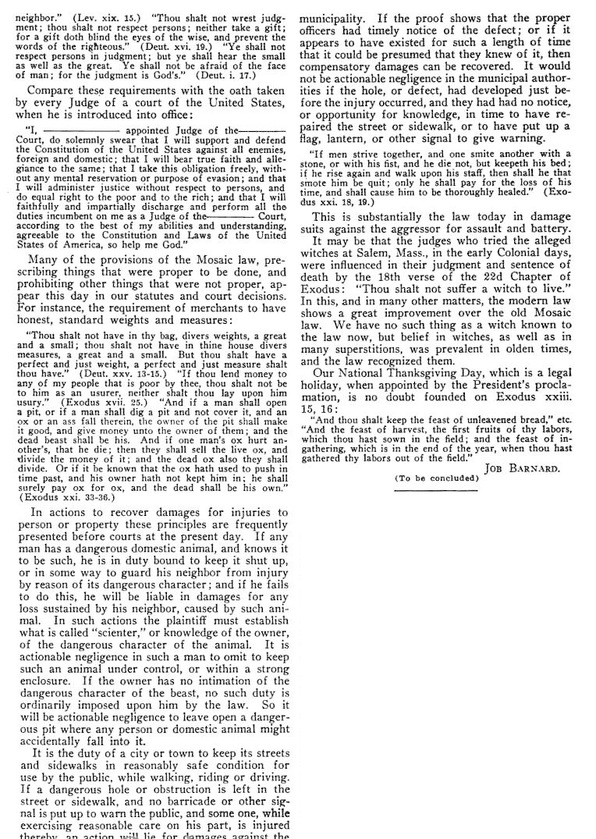
CONTINUED BELOW
from the November 25, 1914 issue of
The New-Church Messenger:
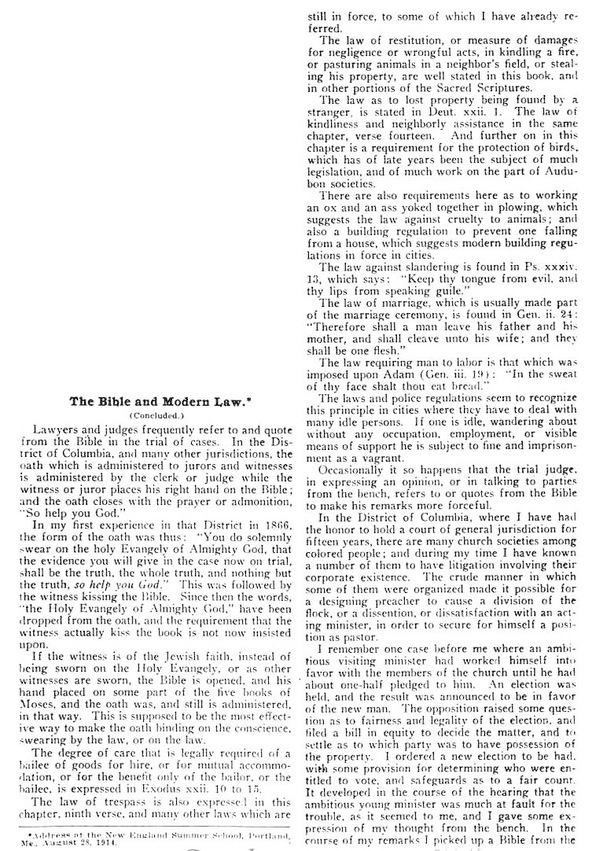
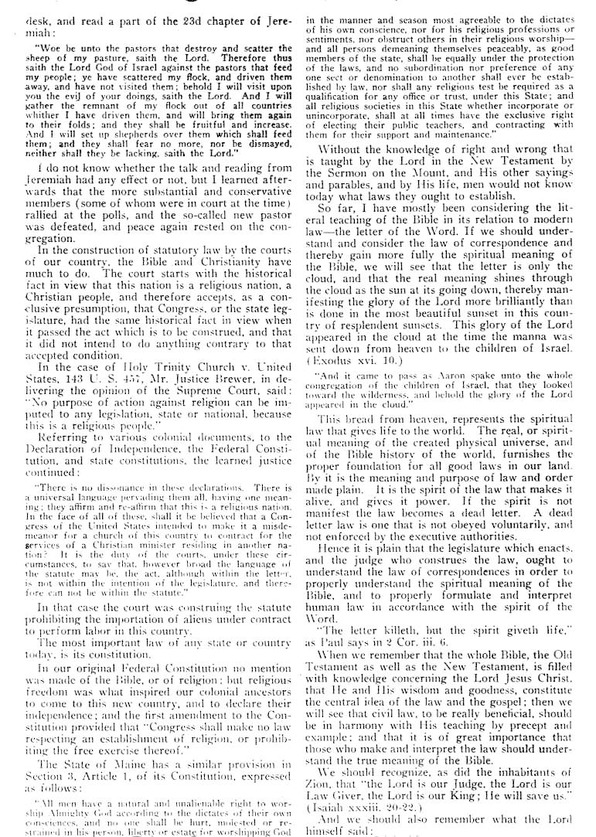
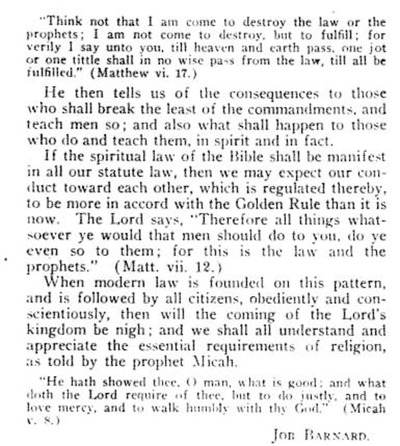
1915
from the July 21, 1915 issue of
The New-Church Messenger:
